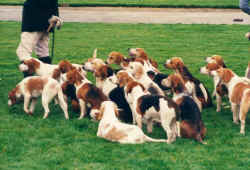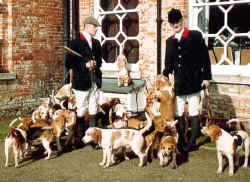
| Beagling Article by Liam Thom |
| This article first appeared in Hunting
Magazine in October 1997 when I was the huntsman to the Stour Valley
Beagles. A large open country in the flat counties of
Suffolk and Essex.
Beagling is foxhunting in miniature, the hounds are smaller, the kennels are scale models, hunt staff are fewer and the cost is a fraction. The range of grandeur is much the same, however, and while a field of five or ten can meet on a wind-swept Northern moor, charging the cost of a drink for the experience, a hundred may meet in front of a big house in the Home Counties, with hounds arriving in smart vans and trailers, and the staff dressed as for the Heythrop. whether those up on the fell have better sport than the downcountry folk is a debatable point, but they win hands down when it comes to getting thoroughly well lubricated and filling public houses with songs about foxes on rocks, Joe Bowman and men from Denby Dale. The thruster is equally well catered-for because, as long as he gives hounds a bit of room, keeps out of the huntsman's earshot when the pack splits six ways on two litters, and makes sure that all is seen that somebody up front should have seen, ready to impart knowledge to the panting huntsman, then the thruster should be welcome. The only danger for the fast beagler is that the Master may put a whip in his hand and tell him to get to the top of that hill / by that road / next to that farmer's ostriches / to them hounds two miles away that are exercising the fox that the Kissmeoats Farmers' Foxhounds left behind the previous day. The most useful member of the field is one who cannot tell a hunted hare from a fresh one. by them you will not be approached 45 minutes after you have caught your hare, to be told that they changed and that the real one is absolutely cooked in the withy bed. "Absolutely cooked" is a misnomer for hares which have just got out of their form, yawned, stretched their legs and wandered off at a lope to find out if Farmer Mangold's barley tastes any better this morning - oh, and what are those noisy dogs doing over there? Almost all information from people who know a hunted hare from a fresh one is to be treated with as much courtesy and salt as you can muster. Anybody who knows enough not to have learned the difference between a hunted hare and a fresh one can generally be relied upon to tell you within two feet where to catch your hare. Hare populations in many countries are waxing, which the pessimistic beagler will tell you is a bad thing. Is it 'eck as like? A large population of hares means that no time is lost searching for something to hunt. It also means that if you end a hunt you have not too far to go before you are off again. The thing to do when confronted with many hares is to keep hunting the same area, which is something the beagler can do, but which a harrier pack usually cannot. The important thing is to bring back any hounds which get outside the circle, otherwise you might find yourself with one couple of young hounds, and the rest of the pack hunting round and round in circles three parishes away and having added to their tally four times without telling you. The best thing about a healthy hare population is that hounds become totally focussed on that quarry, something which is important to young beagles that would hunt a bush if it gave off a scent and moved fast enough. Too many in the beagling would thing that beagles will never run steady to riot. This of course is rubbish. The Dummer and the Brighton and Storrington are both steady packs (and not pet hounds either) with tallies well above the average. Making a riotous pack steady does not happen overnight. It takes years of selective breeding, but is greatly helped by delicate use of the whip (which means catching them in the act and telling them what you think of them) and a fair bit of draughting. What makes life easier is if the riot is only in half the country (as in ours at the Stour Valley) that you do not need to be rid of perfectly good hounds that happen to like the smell of roe. it is often said that the best training ground for an MFH is a school or college pack of beagles. You would be foolish to disagree. By running after little hounds you should learn respect for your hunter when you take on a mounted pack. The young MH has the benefit of a lifetime's knowledge from the kennel-huntsman who will usually impart that wisdom as colourfully and succinctly as he knows how, sometimes followed by the RSM's "Sir". Beagles tend to hunt themselves and, while they will ignore a useless huntsman, a young paragon with athlete's legs will have them eating out of his hand. Hunting beagles gives more opportunities in a day of seeing hounds at close quarters and of trying to give assistance than might be possible in a month hunting Charlie. Moreover, because the smaller hounds' noses work that bit better, the chances of coming out of a check are that much greater. But beagling is more than a training ground for the up-and-coming foxhunter; it is the height of venery.
|
||
|
Countrysports and Country Life is indebted to Liam Thom for permission to publish this article on Beagling which appears on one of his excellent hunting sites http://www.iwbeagles.co.uk another excellent site which he is responsible for is http://www.iwfoxhounds.com
|
||

